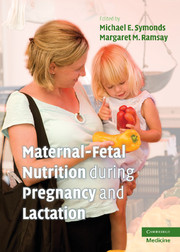Book contents
- Maternal-Fetal Nutrition during Pregnancy and Lactation
- Maternal-Fetal Nutrition during Pregnancy and Lactation
- Copyright page
- Contents
- Contributors
- Section 1 Nutritional regulation and requirements for pregnancy and fetal growth
- Section 2 Nutritional regulation and requirements for lactation and infant growth
- Section 3 Specialized requirements
- Chapter 12 Teenage pregnancies
- Chapter 13 Vegetarians and vegans during pregnancy and lactation
- Chapter 14 Hyperemesis in pregnancy
- Chapter 15 Multiple pregnancy
- Chapter 16 Mineral and vitamin supplementation before, during, and after conception
- Chapter 17 Determinants of egg and embryo quality: long-term effects of maternal diet and assisted reproduction
- Chapter 18 Nutrition, environment, and epigenetics
- Index
Chapter 17 - Determinants of egg and embryo quality: long-term effects of maternal diet and assisted reproduction
from Section 3 - Specialized requirements
Published online by Cambridge University Press: 26 February 2010
- Maternal-Fetal Nutrition during Pregnancy and Lactation
- Maternal-Fetal Nutrition during Pregnancy and Lactation
- Copyright page
- Contents
- Contributors
- Section 1 Nutritional regulation and requirements for pregnancy and fetal growth
- Section 2 Nutritional regulation and requirements for lactation and infant growth
- Section 3 Specialized requirements
- Chapter 12 Teenage pregnancies
- Chapter 13 Vegetarians and vegans during pregnancy and lactation
- Chapter 14 Hyperemesis in pregnancy
- Chapter 15 Multiple pregnancy
- Chapter 16 Mineral and vitamin supplementation before, during, and after conception
- Chapter 17 Determinants of egg and embryo quality: long-term effects of maternal diet and assisted reproduction
- Chapter 18 Nutrition, environment, and epigenetics
- Index
Summary
Keywords
- Type
- Chapter
- Information
- Maternal-Fetal Nutrition During Pregnancy and Lactation , pp. 167 - 179Publisher: Cambridge University PressPrint publication year: 2010



